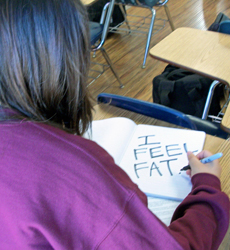 By Eunice Kim, Arnold O. Beckman High School, Grade 9
By Eunice Kim, Arnold O. Beckman High School, Grade 9
May 31, 2011
Earlier this month, the Archives of General Psychiatry published an analysis of the largest and most comprehensive study of teen eating disorders in the United States. The researchers surveyed 10,123 teenagers and found that “teens suffering from anorexia, bulimia and other eating disorders are more likely to suffer from suicidal thoughts, anxiety disorders and substance abuse.” While cases of extreme eating disorders may not be a prevalent issue in our individual communities, negative body image and constant thoughts of dieting are certainly rampant for many young girls.
As Hollywood continues to portray beauty as only “slim” or “skinny” and as the tabloids continue to ridicule and emphasize the physical flaws of celebrities, teenage girls can’t help but absorb those lies as truth. In our health classes at school, we are adequately taught to avoid the paths that lead to eating disorders. While we, young women, are indeed repulsed by appalling images of anorexia and bulimia, we also are mesmerized by images of supermodels and actresses who appear on our favorite magazine covers.
“The models for designer brands are so skinny and beautiful. I don’t think I could ever look like that even if I go on a diet and exercise all day long,” said Hannah Lee, a junior at Cypress High School. It’s not unusual for teenage girls to idolize and look up to beautiful models and actresses. But when these role models communicate a message that limits the definition of beauty to a certain size, then there’s no way the average girl can feel confident about her body.
Even in middle school, girls begin to become more conscientious about their body image. “I care about my weight because I don’t want to look fat. I usually eat at home because I don’t like eating in front of guys,” said Kayley Saade, 8th grader at Oxford Academy. It is not an unusual practice for teenage girls to simply sit around and talk during lunch at school while the guys chomp down on pizzas and burgers.
Erika Yi, also an 8th grader at Oxford said, “I believe that I am fat because of the people around me. I may weigh more than my friends, but I’m also much taller. Still, it doesn’t feel good to be called fat at all.” There is no reason why girls like Erika should be labeled as fat. The combination of social pressures and all the skinny girls on television create an unrealistic expectation for so many young women.
“Our culture is partly responsible for eating disorders like anorexia in young girls. So many people carry this ridiculous idea that having beauty equals being skinny,” said Deborah Park, a graduate student at UCI. “When young girls look in the mirror and they don’t see ‘super-skinny,’ they can understandably resort to unhealthy diets, which can lead to eating disorders.”
While most girls will admit to wanting to be skinnier so that they are considered more beautiful, not all guys seem to agree. Keith Choison, a sophomore at Kennedy High School said, “I don’t think that being skinny is beautiful. For me, personality outweighs everything. It’s probably a good thing to maintain a healthy weight, but I think a lot of girls go way overboard with all these diets.”
It may be a slippery slope from certain diets to eating disorders. Suicidal thoughts, anxiety disorders, and substance abuse all seem like such a heavy price to pay just to lose a few pounds.


